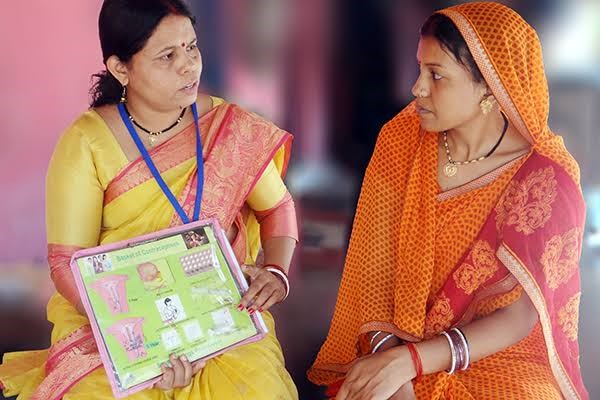
Accredited Social Health Activist (ASHA)

10.10.2023
Accredited Social Health Activist (ASHA) , Daily Current Affairs , RACE IAS : Best IAS Coaching in Lucknow
|
For Prelims:ASHA,sickle cell disease,Types of sickle cell disease For Mains:Accredited Social Health Activists,Work,Selection criteria: ,Compensation for Asha,Difference between sickle cell anemia and sickle cell disease,Government Initiatives
|
Why in news?
The government is planning to encourage ASHA workers to identify persons suffering from sickle cell and mobilize eligible persons for distribution of sickle cell cards.
important point:
- Considering the seriousness of sickle cell disease, the government is motivating citizens to get tested for this disease.
- The central government is promoting its campaign to "eliminate" sickle cell disease (SCD) in India by 2047.
- The mission will include awareness generation, universal screening of seven crore people in the age group 0-40 years in the affected tribal areas and counseling through collaborative efforts of central ministries and state governments.
- Initially, the focus is to be on 17 states with high prevalence of SCD, Gujarat, Maharashtra, Rajasthan, Madhya Pradesh, Jharkhand, Chhattisgarh, West Bengal, Odisha, Tamil Nadu, Telangana, Andhra Pradesh, Karnataka, Assam, Uttar Pradesh, Kerala , Bihar and Uttarakhand.
About Accredited Social Health Activists (ASHA):
- Asha is a trained female community health worker.
- Asha workers are a core part of the National Rural Health Mission launched by the Government of India.
- Selected from and accountable to the community, ASHAs will be trained to act as an interface between the community and the public health system.
- ASHA is currently applicable in all States/Union Territories (except Goa).
- It is mandatory for states to appoint at least one ASHA worker for every 1000 people.
- Around 9.15 lakh ASHAs are working in rural areas and 76,795 in urban areas across the country.
Work :
- Acting as a care provider at the community level.
- To facilitate access to health care, medical and sanitation services.
- To increase the level of awareness about health related issues among the marginalized sections within the community.
- Advocacy of women's health and hygiene standards.
- Advocate health conscious behavior and approach towards livelihood.
Selection criteria:
- Accredited Social Health Activists (ASHAs) are selected through a rigorous process of selection involving various community groups, self-help groups, Anganwadi institutions, Block Nodal Officers, District Nodal Officers, Village Health Committee and Gram Sabha.
- As far as its recruitment is concerned, States have been given the freedom to relax the population criteria as well as educational qualification on a case to case basis, depending on local circumstances.
- In rural areas, ASHA should be a married/widowed/divorced woman primarily resident of the village, preferably in the age group of 25 to 45 years and literate, preferably up to 10th class qualified (formal education up to class 8).
- In urban areas, the ASHA should be a female resident of "slum/vulnerable groups" and should belong to the particular vulnerable group that has been identified by the City/District Health Society for selection of ASHA, and should have good communication and leadership skills. Should be.
Compensation for Asha:
- An ASHA worker is primarily an "honorary volunteer", but is compensated for her time in specific circumstances (such as training attendance, monthly reviews, and other meetings).
- On an average, the monthly income of an ASHA worker ranges from Rs 2,000 per month to Rs 7,000 per month, depending on the state.
- Additionally, he is eligible for incentives offered under various national health programmes.
What is sickle cell disease:
- Sickle cell disease is a chronic single gene disorder that causes a debilitating systemic syndrome characterized by anemia, acute pain and chronic injury, and a shortened lifespan.
- Sickle cell disease, a debilitating genetic blood disorder, is particularly prevalent among tribal populations across India.
What is the difference between sickle cell anemia and sickle cell disease?
- Sickle cell disease is an umbrella term for several different types of sickle cell disorders.
- Healthcare providers reserve the term "sickle cell anemia" for the types of SCD that cause the most severe anemia. These types are hemoglobin SS and hemoglobin beta zero thalassemia.
Types of sickle cell disease:
- sickle cell anemia.
- Sickle hemoglobin-C disease.
- Sickle beta-plus thalassemia.
- sickle beta-zero thalassemia
Government Initiatives to Tackle SCD:
- National Mission to Eradicate Sickle Cell Anemia announced in the Union Budget 2023-2024.
- The government has issued technical operational guidelines for the prevention and control of hemoglobinopathies, including sickle cell anemia, in 2016.
- Integrated centers have also been set up in 22 tribal districts for treatment and diagnosis.
- The State Hemoglobinopathy Mission has been established in Madhya Pradesh to address the challenges in diagnosis and management of the disease.
- Government of India Scheme for Permanent Disability Certificate for Sickle Cell Disease (SCD) patients in the age group of 5+.
Source:ET Government